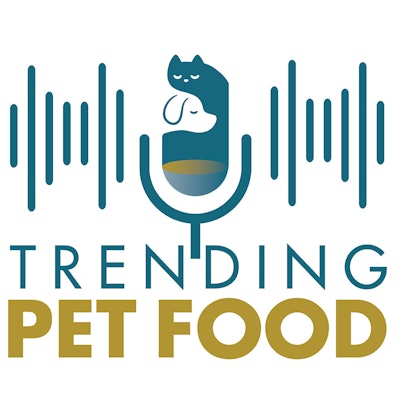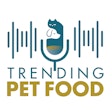
Lindsay Beaton sits down with Dr. Chyrle Bonk, veterinarian and Senior Tail Waggers contributor, to peer into the minds of pet owners and find out what they’re looking for and what kinds of questions they’re asking when it comes to their dogs' and cats' nutrition.
The below transcript is from Episode 60 of the Trending: Pet Food podcast, where I spoke with Dr. Chyrle Bonk, veterinarian and Senior Tail Waggers contributor, about the perception of pet owners regarding nutrition. You can find the episode at Trending: Pet Food, on SoundCloud or on your favorite podcast platform. This episode originally aired on April 23, 2024.
We want to thank Cargill for sponsoring this podcast. Cargill, a world leader in pet food ingredients and manufacturing, proudly offers TruMune postbiotic. TruMune is made to help modern pet food brands stand out by supporting multiple trending health claims — like gut health, balanced immunity and pet vitality. Best of all? TruMune benefits are packed into a single, low-inclusion ingredient, and it’s backed by several pet-specific research studies.
Lindsay Beaton – editor, Petfood Industry magazine, and host, Trending: Pet Food podcast: Hello, and welcome to Trending: Pet Food, the industry podcast where we cover all the latest hot topics and trends in pet food. I’m your host and editor of Petfood Industry magazine Lindsay Beaton, and I’m here today with Dr. Chyrle Bonk, veterinarian and contributor to Senior Tail Waggers. Hi Dr. Bonk, and welcome!
Dr. Chyrle Bonk, veterinarian and Senior Tail Waggers contributor: Hi Lindsay, and thank you for having me.
Beaton: In case you’re not familiar with Dr. Bonk or Senior Tail Waggers, here’s what you need to know.
Dr. Bonk graduated from Oregon State University in 2010 with a doctorate in Veterinary Medicine. She also earned a bachelor of science in Animal Sciences from the University of Idaho in 2006. She has practiced as a licensed veterinarian for Clearwater Valley Veterinary Clinic in Orofino, Idaho for over 10 years, gaining a wealth of experience in caring for cats and dogs. In addition to treating pets and writing for various veterinary websites, including Senior Tail Waggers and Cat World, Dr. Bonk also owns several dogs, cats and a small cattle herd.
Senior Tail Waggers is a website written by veterinarians and animal behaviorists covering veterinary and pet behavior topics. The organization’s mission is to elevate the health and well-being of pets through free pet owner educational resources. With a focus on providing practical, accurate and scientific information in an easy-to-understand way, Senior Tail Waggers aims to help more and more pet owners create happier lives for their beloved pets.
Dr. Bonk’s veterinary expertise and connection with pet owners are why I’ve brought her on today to answer this question: What are some of the main pet owner perceptions of pet nutrition?
Now one of the big questions in the pet food industry that goes back and forth is how aware of pet nutrition are current pet owners? And how often does it come up in a conversation with their veterinarian?
Dr. Bonk: I would say probably half of pet owners are at least aware of nutrition and aware that it's more than just dumping food in the dog's bowl every day. However, the conversation does not come up very often, especially if vets are to leave it to pet owners themselves to bring it up.
Probably the most common age group that we see interest in nutrition is with new puppies. A pet owner will bring their new puppy into the vet for those first few checkups, and they have all kinds of questions as far as how do I potty train? How do I obedience train? What should I be feeding? After those puppy years, the conversation really dies down from the owner’s standpoint because they don't realize that nutrition changes throughout a dog's life, and that they need to be up to date with what's going on.
You just don't see that conversation brought up especially in those healthy adults, you know, they're active energetic. It's not something that owners are thinking about, because it's that “if it's not broke, don't fix it” kind of attitude. If their dog seems to be doing fine, why do I need to change what I'm doing as far as feeding them?
It maybe comes up a little more as dogs get older, because some vets will notice either a change in their energy level or a change in their weight, whether gaining or losing weight. They might bring up nutrition to their vet at that point to say, what can be done here to help my poor, elderly dog live a better, happier life?
One area that we really don't see is with these specific conditions, because a lot of pet owners don't realize that nutrition can play a huge role in either preventing certain health conditions or in treating and managing those health conditions. In those cases, it's up to the veterinarian to bring that to the pet owner’s attention that nutrition plays a huge role. I think a lot of owners are aware but not necessarily concerned with what they need to do to change things for them.
Beaton: Is it on the veterinarian’s checklist of things to ask if you're just bringing your pet in for a normal visit? Or does it also only come up when a veterinarian notices something like obesity is a huge problem? Obviously, that would be a nutrition conversation to be had. How proactive do veterinarians feel they can be in discussing nutrition with pet owners? And when you do discuss it with them, do you find that pet owners are receptive? Are they a little reticent to change what they're doing at home? Do they get offended if you tell them that their beloved pet is overweight or obese, and some changes need to be made? What is the dynamic like when it comes to that?
Dr. Bonk: It really depends. I feel that nutrition should be brought up by the vet every single time, whether it be a wellness exam or a sick dog or whatever. But that doesn't mean that it always comes up simply because you only have an allotted amount of time that you are with the owner and the pet, and there's a lot of things that must be covered, especially if we're dealing with an illness.
Also, what you might be dealing with owners that get overloaded with information at veterinary visits. It's a lot for them to take in, so you're hoping that they're taking in the main points with nutrition being one of them. That's not always the case, especially if they're hearing about this newly diagnosed disease that their pet has.
It's a hard conversation sometimes. On that obesity standpoint, a lot of owners don't realize that their pet is overweight. When the vet brings that up, some can get a little defensive. A lot of times the reason that their pet is overweight is from something that they're doing or not doing. They can get a little defensive and not want to take a veterinarian's advice. It is something that should be always talked about, but like you said, it's hard to fit it in. It's hard to get owners to really understand, because they're taking in a lot of information at the same time.
Beaton: How did veterinarian stay up to date on companion animal nutrition? I know that it's not a huge area of focus when you're going through vet school, you get maybe a couple classes on it in general, but so much changes. And there's so much research coming out all the time. Who do you depend on to stay up to date on nutrition and how much of it is compulsory? How much of it is optional? Could you really be a vet focused on nutrition if you wanted, and then if you had no desire, you could just stick with the basics?
Dr. Bonk: A lot of our information comes from the individual pet food companies. Depending on what brands of food that are sold in the clinic or recommended in the clinic, they'll often send representatives, whether it's monthly or quarterly, to the clinic to discuss new products and the research they’re doing in an area. They might offer some pamphlets or informational books or even some free samples. But that's very, of course geared toward their product but it’s not an overall view of small animal nutrition.
The other area is some veterinary schools. Then again, the pet food companies will put out continuing education classes, either online or in person where they'll present current information and research and new products that are available. It really depends, if you're getting information from your local veterinary school, it'll be a little broader. Whereas if you're getting information from a pet food company, it's going to be more focused on what their products are and what they're doing.
It is not a big field. I think most general, veterinarians just have the basics then they know what there's specific companies that they use can offer. You'd have to work more at a referral specialty or like a veterinary hospital to get really in depth and in detail about nutrition.
Beaton: What are the most useful resources out there right now? Is it veterinary conferences where they have sessions on animal nutrition? Are there any pet food companies who are really doing it right and make good research accessible? Where's the go-to place for veterinarians right now looking to stay on top of nutrition?
Dr. Bonk: Your local veterinary teaching hospital, because they're the ones that are putting on a lot of that continuing education, but they're also the ones that you can refer your animals -- your patients -- to or the ones that you're going to call when you have a particularly difficult case.
You work with those places very closely in a lot of situations. Nutrition is definitely one of them simply because they're local to you, you probably use them in some aspect or another besides nutrition, and also, they're very unbiased as far as products and companies that they like to work with. That's usually my go-to because I don't want to go to a specific pet food company that will push their product which maybe isn't the best for my particular patient. I usually look towards those veterinary teaching hospitals.
Beaton: Is there a strong link between veterinarians and whatever the closest veterinary hospital is? In general, is there a lot of communication? Maybe veterinarians teach a class, or the students come to visit the vets? Is that a pretty common thing?
Dr. Bonk: Yes. For example, our closest teaching hospital is Washington State University. Not only do we attend classes there, but it's also a place I call when I just have no idea where else to go on difficult cases. It's where I refer those surgeries that I can't do or those cases that need more in-depth imaging or whatever it might be. It's also the place where students come from that can then do preceptorship or volunteer their weekends with. I would feel like that's normal for most veterinary colleges, not just Washington State. They're a great resource for both the vet and vets are a great resource for them.
Beaton: Speaking of challenges, what are the top challenges veterinarians are facing right now, in helping guide pet owners with their pet’s nutrition?
Dr. Bonk: We're going to go back to the obesity issue. It's a big problem, literally and figuratively, it's a big problem.
I have read somewhere that over 50% of pets are overweight, not obese, necessarily, but overweight. That's huge. I think there's three main reasons behind it. The first one being that pet owners just don't realize it. Overweight animals have become more of the norm and more of what people are used to seeing. It’s to the point that when they see an animal that's an ideal weight, they think, “oh my gosh, that animal is so skinny!” I've had clients bring their pets in and say, “My cat or my dog is so skinny, what do I do?” You have that hard conversation. “Actually, this is what a dog should look like.” They just don't realize it.
One of the challenges with that, then is a lot of owners say, “Well, I don't have a scale, so I can't track their weight.” I think an important resource for vets to throw out there is the idea of a body condition score rather than a weight of judging an animal's body. There are simple charts that vets can hand out -- or even pet food companies -- could hand out just for people to gauge how their animal is at home. No tools necessary, very simple. Just a way for owners to track their animals weight and health.
Another reason is that pet owners don't know how much to feed. They either aren't aware of the recommended feeding guidelines that are on pet food bags, or they don't understand them. One thing I've seen is, it'll say for their dogs, feed two cups. And they don't realize that it's two cups per day, not two cups per meal. So instead of feeding two cups, throughout the day, they're feeding two cups at every meal, which typically becomes way too much food. The other problem is they don't realize that a cup is an actual cup measure, not just whatever drinking glass they have in their house -- it's an actual measure.
We had a pet food company give us a bunch of actual cup measures that we could then distribute to clients. That made a huge difference. So many pet owners were like, “Oh, good, actual cup, not just whatever cup I had lying around my kitchen.” It really helped people see the proper amount of food to keep their animal at a healthy weight.
The third reason for obesity is that we tend to over-love our pets, especially when we're feeling guilty that we didn't get to take them for as long of a walk as we wanted, or they didn't get to go to the dog park. We give them a treat as a way for us to feel better about it. The dogs know the difference. Pet owners don't realize that those treats really add up and can make quite a difference in their caloric intake, therefore their weight. So that's a huge issue.
Another issue is pet owners want to know, well, what should I feed my dog? I will recommend a few different brands or formulas, and when they find out the cost, they're done. It’s too much. They're not even going to think about it any further.
If there was a better way of relating that cost to people to show them that, yes, higher quality foods do cost more. But -- they also tend to produce less waste. They also tend to require less per day. If they were able to see that, yes, it does cost $20 more a bag, but you end up feeding less overall. I think that would really help them get onboard with getting better quality food rather than just focusing on the price. It could come in the form of a pamphlet or a chart or something, so they can compare a lower quality does cost this much, but you also eat six cups of it, whereas higher quality food costs this much, but you only have to feed three. That could help owners really see you’re paying more. Not only is it more beneficial nutritionally for your animal, but it all shakes out in the long run to where you're feeding less, you're getting less waste, and it's healthier.
Beaton: What have you found as a veterinarian is the most effective way to communicate about nutrition with pet owners? Do you give them research? Do you give them the pamphlets? Do you start where they're at, and work on making tweaks? What helps disarm them so they're more receptive to the conversation of feeding their pet in a healthy way?
Dr. Bonk: I take the baby steps approach. If you try to completely makeover how they're feeding and what they’re feeding, it can be a little overwhelming. Trying the baby steps approach of first presenting them with, this is what you are feeding and this is where it's lacking. We need to add a little of this to make it better, or switch to this food to make it better, or to switch the amount of feeding for now, and then we'll go to a different food later.
For example, in dogs that are overweight, it can be a lot to change the food and change the amount they're feeding at the same time. Sometimes we'll start by continuing with their normal diet but feeding them less. Then as they get more used to that, we can talk about switching to a lower-fat, higher-fiber diet. I feel like to make those small steps. Any vet visit, pet owners are just being like bombarded with information. If you can make those adjustments smaller, I feel like they're definitely more willing and less defensive.
Beaton: Are you mostly hearing nutrition questions about food? Or treats? Or supplements? Have supplements entered the conversation yet?
Dr. Bonk: Definitely. A lot of questions I get are about different dietary trends. For example, grain-free diets, or organic or human-grade diets I get questions because the owners are hearing just the name of the trend and wanting to know, “Should I be feeding that?”
Same with supplements. There's a supplement for everything you can imagine on the market. When a pet owner hears about a supplement that can help with “A,” immediately they think, “Well, my dog seems to have this problem, so I probably need a supplement.” I get a lot of questions just wondering if their dog needs these.
Beaton: If you had your way, what would be the ideal balance of communication among veterinarians, pet owners and the pet food industry when it comes to pet nutrition? Where would the onus be for unbiased education? How could everybody work together to bridge some of the gaps and make sure everybody has the latest nutrition information? I guess academia as well, since you said, academia is a big source for you.
Dr. Bonk: Hmm, I feel like again, if we could just do little things more frequently, rather than the once a year when a lot of pet owners see the vet, get tons of information and possibly changing the whole way that they're doing things.
It would be nice if we could just have more little check-ins along the way. Whether that be biannual visits or just like a monthly text or email saying, “How was Rover's weight this month? Have you done his body condition score?” This would help owners continue to think about it. If it's on their mind once a month, then they're on track to -- whether it's weight loss or their dogs getting older and they need to start looking into a senior food -- if it's on their mind, hopefully they're spending a few minutes thinking about it where it's not such a big overload or big change that once a year when they do see the vet.
Same goes for pet food companies. Give us information in little bits instead of every time. It's the same for the vets when the company rep comes quarterly, they have a lot of information to give you based on the past four months of what the company has been doing. More frequent check-ins with just a little information here and there would be more helpful to keep it on everybody's mind but not having it take over.
One thing I really wanted to hit on because it's one of my favorite tools that I use in the clinic is we have these little cards. They say, “Eating an ounce of cheese for your 20-pound dog is like you eating two and a half hamburgers,” or something like that. It gives you a little visual -- a little picture of the cube of cheese and two and a half hamburgers. It’s a great way for people to really relate that information because the vet can say, “Don't feed human food, because it's bad for your dog.” But seeing that tiny piece of cheese that I've been hiding their pill in, is really having a huge effect on the calories they take in.
Being able to see it in familiar information, like related to hamburgers per person … Everybody knows, if you eat two and a half hamburgers, it's not good for you, so being able to relate it to people that way has been huge. A lot of people don’t realize that the scoop of ice cream I give my dog every night is like a person eating a bag full of candy bars. The cards have been helpful for pet owners to really see what they're doing when they're feeding human food.
Beaton: Do you think that plays into or takes advantage of the humanization trend where more and more people are looking at pets as members of their families and really the only nutrition guidelines we know about our own. As you're looking at this animal, the average person doesn't know anything about the gastrointestinal tract or caloric needs of a dog or a cat, so they think, “Okay, a smaller animal, so maybe something a little bit smaller?” Do you think that's the onus behind those types of cards? Pointing out, “this is not a human … this is what the equivalent would be,” and filling in some of those gaps, some of the misconceptions about the “human-to-animal-transfer,” I guess?
Dr. Bonk: Yes, absolutely. If you said feeding one cube of cheese was like feeding your dog two cups of dog food, it wouldn't have the same effect as people being able to see what it would be like in human food.
Along those same lines, pet owners need to realize that dogs are dogs when it comes to nutrition. They're not wild animals. They're not humans. I see a big divide in clients. You have one group where they think, “Well, my dog is an animal. Animals have survived on the landscape for thousands of years eating what they could catch or what they could scavenge. Therefore, I don't need to put that much thought or effort into my dog's nutrition. they shouldn't be fine no matter what I put in their bowl.”
Then you have the other group of owners that are like, “This is my furry child. It needs to eat the same quality of food that I do.” What we really should be focused on is that dogs have very specific needs. They are not like wild animals. They're not like humans. They're like dogs, and they need these nutritional components met. They need good quality food that they can digest. Whether that food is human-grade or organic or grain-free depends on what the owner’s beliefs are. First and foremost, they need to make sure they are feeding for the nutrition of the dog and not for their own comfort or benefit.
Beaton: I think that is an excellent point to end on and summarizes everything we've been talking about. One of the big conversations in the industry is how to convey that animals are animals and people are people, and they don't have the same needs. Even if they are our family members, they're not human, so we need to make sure we're taking care of them.
It really is an all-hands-on-deck situation. It's the veterinarians who are on the front lines, and the pet food manufacturers who are producing this food trying to do what they can based on what consumers want but also what's best for the pet, and then academia and the gaps in nutrition education for pets. There's just so much going on, that it's been helpful to have you on to discuss all of that and get an insight into the pet owner’s mind and where they're at in nutrition right now and the kinds of things they're asking their veterinarian. Thank you so much for being on.
Dr. Bonk: Yes, thank you for having me.
Beaton: Before we go, I always like to do a little plug. Where can people find more information about you and Senior Tail Waggers?
Dr. Bonk: I'm on LinkedIn as Chyrle Bonk. I am also at Senior Tail Waggers website. I've written articles. I've reviewed articles. And I think it's just a great place for pet owners to get information because it's all written by vets and reviewed by vets. It's nice, easy to read, not a lot of scientific words to wade through and all relevant information that pet owners are looking for.
Beaton: That's it for this episode of Trending: Pet Food. You can find us on petfoodindustry.com, SoundCloud or your favorite podcast platform. You can also follow us on Instagram @trendingpetfoodpodcast. And if you want to chat or have any feedback, I'd love to hear from you. Feel free to drop me an email: [email protected].
And of course, thanks again to our sponsor, Cargill. This world leader in pet food ingredients and manufacturing proudly offers TruMune postbiotic. TruMune is made to help modern pet food brands stand out by supporting multiple trending health claims — like gut health, balanced immunity and pet vitality. Best of all? TruMune benefits are packed into a single low-inclusion ingredient, and it’s backed by several pet-specific research studies.)
Once again, I'm Lindsay Beaton, your host and editor of Petfood Industry magazine, and we'll talk to you next time. Thanks for tuning in!



















